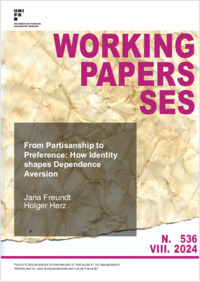From Partisanship to Preference: How Identity shapes Dependence Aversion
BP2-STS
- Jana Freundt ORCID Lucerne University of Applied Sciences and Arts, School of Social Work
- Holger Herz ORCID University of Fribourg, Department of Economics
- 2024
81 p.
English
We study how individuals’ willingness to delegate choice is affected by heterogeneity in identity between the delegee and the delegate. While it is straightforward that such heterogeneity can affect delegation for instrumental reasons, we show experimentally that divergent identity also causes delegation aversion through purely intrinsic channels. More specifically, we demonstrate that Republicans (Democrats) are intrinsically less averse to delegate decisions over their own outcomes when the delegate also identifies as a Republican (Democrat), compared to when the delegate identifies as a Democrat (Republican). By design, beliefs about the actions of the delegate cannot explain the observed treatment effect. Our finding suggests that contrasting identities impede the creation — or the continuation — of shared institutions that rely on centralization of control beyond what can be explained by purely instrumental reasons.
- Collections
- Faculty
- Faculté des sciences économiques et sociales et du management
- Language
-
- English
- Classification
- Economics
- Series statement
-
- Working Papers SES ; 536
- License
-
License undefined
- Persistent URL
- https://folia.unifr.ch/unifr/documents/329242
Statistics
Document views: 198
File downloads:
- WP_SES_536: 225
